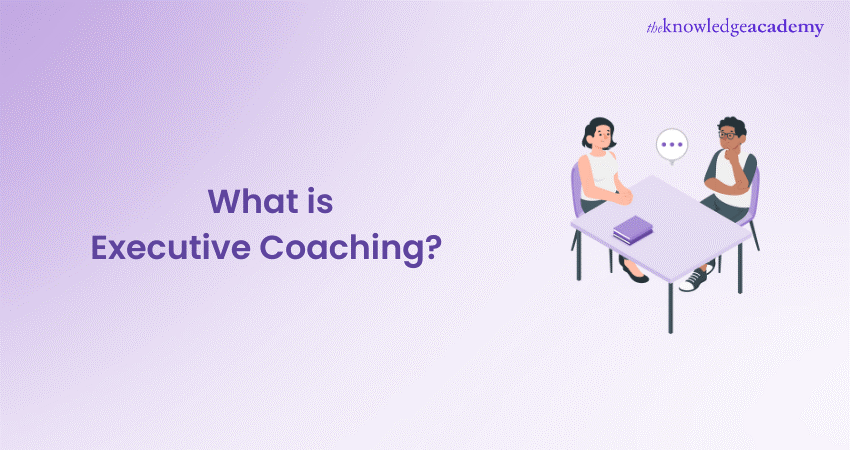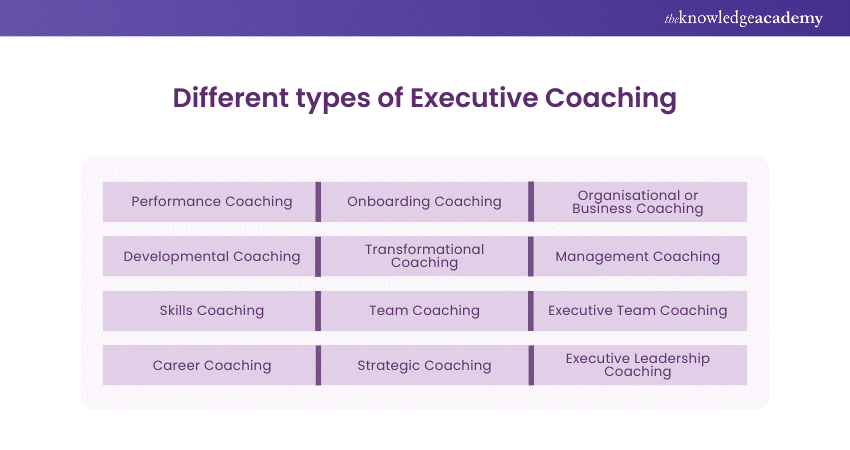We may not have the course you’re looking for. If you enquire or give us a call on +44 1344 203 999 and speak to our training experts, we may still be able to help with your training requirements.
Training Outcomes Within Your Budget!
We ensure quality, budget-alignment, and timely delivery by our expert instructors.

Are you curious about how executive coaching, including life coaching, transforms leaders into powerhouses of success? It all begins with understanding "What is Executive Coaching?" It is a process that offers personalized support and guidance to leaders to overcome challenges. In this comprehensive blog, we will cover Executive Coaching, its various types, processes, essential skills, and its advantages to individuals and organisations.
Table of Contents
1) What is Executive Coaching?
2) Different types of Executive Coaching
3) The process of Executive Coaching
4) What skills are necessary to excel as an Executive Coach?
5) Advantages of Executive Coaching
6) Conclusion
What is Executive Coaching?
Executive Coaching is a process that involves a one-on-one interaction between an executive or high-potential employee and a trained coach. It is aimed at improving effectiveness and advancing an individual's professional growth. Executive coaches support and guide leaders to overcome challenges, capitalise on strengths, and reach organisational goals. They act as advisors, offering feedback and accountability to drive success.
Different types of Executive Coaching
Executive Coaching revolves around different approaches tailored to address leaders' specific needs and goals. Here is an overview of the different types of Executive Coaching:

1) Performance Coaching: Performance Coaching focuses on improving employee's effectiveness in reaching organisational objectives. Coaches find performance gaps, set targets, and develop strategies for improvement.
2) Developmental Coaching: Developmental Coaching nurtures an individual's personal and professional growth. It addresses client strengths and improvement areas.
3) Skills Coaching: Skills Coaching aims to acquire and refine specific skills, such as communication, conflict resolution, and Time Management. Coaches give feedback to help clients enhance their skill set.
4) Career Coaching: Career Coaching aids executives in navigating career transitions and pursuing new opportunities. Coaches help leaders clarify career goals and overcome challenges to career advancement.
5) Onboarding Coaching: Onboarding Coaching guides newly hired executives. Coaches help them familiarise themselves with new positions and understand duties and organisational culture.
6) Transformational Coaching: Transformational Coaching focuses on shifting mindsets, behaviours, and actions. Coaches enable executives to reframe perspectives and lead transformational initiatives within their organisations.
7) Team Coaching: Team Coaching involves assisting teams to enhance collaboration, communication, and performance. Coaches promote collective accountability for team success.
8) Strategic Coaching: Strategic Coaching helps executives develop strategic plans, set long-term goals, and take action to achieve them. Coaches support leaders in making informed decisions.
9) Organisational or Business Coaching: Organisational or Business Coaching focuses on improving overall organisational performance. Coaches support companies to identify goals and build plans.
10) Management Coaching: Management Coaching helps newcomers develop essential Leadership Skills and competencies to lead teams within their areas of responsibility effectively.
11) Executive Team Coaching: Executive Team Coaching aims to increase the collective effectiveness of leaders and team members. It involves Coaching, teaching, and positive psychology.
12) Executive Leadership Coaching: Executive leadership Coaching focuses on improving executives' self-awareness, emotional intelligence and ability to motivate others.
Disseminate knowledge and sharpen your active listening skills by signing up for our Train the Trainer Course now!
The process of Executive Coaching
Executive Coaching involves a structured process to enable leaders' growth and development. Here are the key stages of it.
1) Establishing relationships: The first stage requires building trust and rapport between the coach and the client. It covers initial meetings to get to know one another and discuss goals, expectations, and confidentiality agreements.
2) Conducting coaching sessions: After establishing the relationships, coaching sessions start, mainly involving 6–12 sessions. During this stage, coaches explore challenges, set goals, discuss progress, and support clients.
3) Interim periods: Between coaching sessions, interim periods give opportunities for practice and implementing plans. The Executive Coach gives assignments, exercises, or readings to support the client's development. These periods help address obstacles and adjust strategies.
4) Post-session reflection: Coaches can evaluate progress and provide follow-up communication. Clients can take their takeaways and integrate their new behaviour into their leadership practice.
Get familiarised with effective coaching by signing up for our Coaching Skills Course now!
What skills are necessary to excel as an Executive Coach?
Executive Coaches, much like a personal development coach, must have a diverse skill set to guide leaders in their professional and personal development effectively. Here are the critical Coaching Skills required for excellence in this role:
1) Observation skills: Executive Coach must have keen observation skills to understand client behaviours, patterns, and leadership styles. This helps coaches to identify their strengths, limitations and thought processes. It further allows Coach to develop coaching plans and strategies.
2) Effective communication: Effective communication is crucial for Executive Coaching. The Executive Coach must be skilled at both verbal and nonverbal communication, such as actively listening to clients' concerns. Clear communication promotes trust and collaboration.
3) Research and knowledge acquisition: Executive coaches must stay updated with different industry trends and best practices. Continuous research allows coaches to offer insights, tools, and resources to guide their clients.
4) Leadership and management competencies: Executive coaches need a deep understanding of leadership and management principles such as organisational dynamics, strategic thinking and change management. It helps the executive coach to support their clients on how to overcome their challenges.
5) Analytical thinking abilities: Executive Coaches require excellent analytical and critical thinking skills to evaluate critical situations and identify root causes of issues. This allows coaches to give actionable feedback and plans.
Ready to level up your skills and unlock your full potential? Enroll now in our Mentoring Training Course and embark on a transformative learning journey!
Advantages of Executive Coaching
Executive Coaching offers many benefits, from individual professional and personal development to overall organisational success. Here are some of its advantages.

1) Performance improvement: Executive Coaching can increase individual performance by 70% by working on specific performance areas. It increases performance by developing strategies and implementing actionable plans.
2) Increase team performance: Executive Coaching helps leaders gain valuable insights and tools to empower their team members. This leads to improved communication and overall team performance,
3) Leadership skills development: Executive Coaching plays a key role in developing essential leadership skills such as communication, decision-making, and emotional intelligence. Leaders use these skills to navigate complex challenges.
4) Personal benefits: Apart from professional growth, Executive Coaching provides personal benefits that enhance fulfilment. Leaders get clarity on their values, priorities and purpose.
5) Goal setting and achievement: Executive Coaching helps individuals to set goals aligned with organisational objectives. Executive Coache collaborates with leaders to define action plans, track progress, and achieve milestones.
Conclusion
To summarize, what is Executive Coaching? It is a process that empowers leaders to enhance their potential, boost performance, and achieve goals. Executive Coaching helps leaders navigate challenges and succeed in today's competitive environment by providing support, guidance, and feedback. The benefits of coaching are evident as it equips leaders with the tools and insights needed to excel.
Ready to enhance your leadership skills? Enroll in our Coaching and Mentoring Training Course today!
Frequently Asked Questions

Formal training and certification are valuable for becoming an executive coach. Reputable coaching programs accredited by organisations like the International Coach Federation (ICF) are recommended.

The duration of Executive Coaching depends on individual needs and goals. It can range from a few months to a year.

The Knowledge Academy takes global learning to new heights, offering over 30,000 online courses across 490+ locations in 220 countries. This expansive reach ensures accessibility and convenience for learners worldwide.
Alongside our diverse Online Course Catalogue, encompassing 17 major categories, we go the extra mile by providing a plethora of free educational Online Resources like News updates, Blogs, videos, webinars, and interview questions. Tailoring learning experiences further, professionals can maximise value with customisable Course Bundles of TKA.

The Knowledge Academy’s Knowledge Pass, a prepaid voucher, adds another layer of flexibility, allowing course bookings over a 12-month period. Join us on a journey where education knows no bounds.

The Knowledge Academy offers various Train the Trainer Course including Coaching Skills Course, Mentoring Course and Coaching and Mentoring Course. These courses cater to different skill levels, providing comprehensive insights into Hard Skills vs. Soft Skills
Our Business Skills Blogs covers a range of topics offering valuable resources, best practices, and industry insights. Whether you are a beginner or looking to advance your Business Improvement skills, The Knowledge Academy's diverse courses and informative blogs have you covered.
Upcoming Business Skills Resources Batches & Dates
Date
 Coaching Skills Training
Coaching Skills Training
Fri 10th Jan 2025
Fri 14th Feb 2025
Fri 11th Apr 2025
Fri 23rd May 2025
Fri 8th Aug 2025
Fri 26th Sep 2025
Fri 21st Nov 2025







 Top Rated Course
Top Rated Course



 If you wish to make any changes to your course, please
If you wish to make any changes to your course, please


